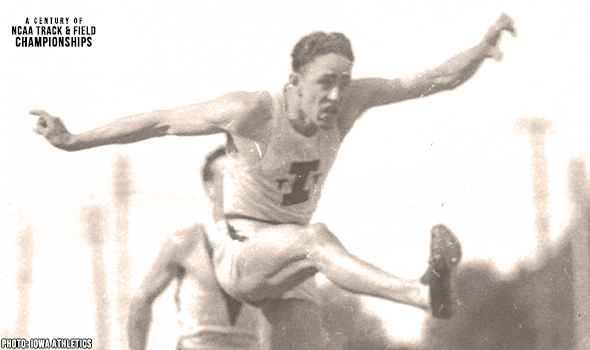
Brookins Hurdled To All-Time Marks
Charles Brookins of Iowa was one of the big stars in the 1923 NCAA Championships, the meet’s third edition held at Amos Alonzo Stagg Field in Chicago.
Brookins ran the world’s two fastest times in the 220-yard low hurdles as he was one of four athletes in the meet to repeat a victory from 1922, when as a sophomore he edged Notre Dame’s Gus Desch in a world record 24.2. Desch, who won the first NCAA 220 hurdles in 1921, had also earned Olympic bronze in the 1920 400-meter hurdles.
That neither of Brookins’ marks from the 1923 NCAA Championships – 23.9 in the heats, 23.6 in the final – was ratified as a world record shows just how much has changed in the sport in nearly 100 years.
It wasn’t just the event, but how it was contested – using the curve for the first portion of the race. The IAAF only ratified straightaway 200/220s (hurdles or sprint) until 1958, and that nearly coincided with when the 220 hurdles was being phased out of the NCAA meet (It was last held in 1959).
Brookins had in fact set ratified world records in the straightaway version – just two weeks earlier at the Big Ten (then known as the Western Conference) Championships he ran 23.2, a mark that would not be surpassed as a world record until 1935, when Jesse Owens ran 22.6 in his Day of Days, also at the Big Ten meet.
Brookins, a native of Des Moines, Iowa, who grew up about 30 miles away in Oskaloosa, won a third-straight Big Ten title in 1924, a year in which there was no NCAA meet so as not to conflict with the Olympic Trials.
He now needed a new event, though, as the 220 lows had long since been replaced on the Olympic schedule by the 400-meter hurdles – not just a longer distance but with hurdles at 36” inches instead of 30”.
Iowa suddenly became a haven for long hurdlers. Iowa coach George Bresnahan – a USTFCCCA Hall of Famer – set up a 400-meter hurdles race a couple weeks before the Trials, but the winner was Hawkeye teammate Chan Coulter, a quarter-miler who shocked in this event at 53.2 when the ratified world record was 54.0. F. Morgan Taylor from nearby Grinnell College was runner-up ahead of Brookins.
Those three made the U.S. team at the Olympic Trials, Brookins also bettering the world record in the heats and semis before losing in the final to Taylor at 52.6, with Brookins (an estimated 52.8) and Coulter following.
A month later at the Paris Olympics, Taylor earned gold while Brookins finished second but was not awarded any medal as he was disqualified for running out of his lane. Taylor’s time of 52.6 was not acceptable as a world record because he had knocked over a hurdle – a rule no longer in force.
Brookins retired from track after winning the 220 hurdles at the 1925 AAU nationals, but Taylor won the 1925 NCAA 220 hurdles and earned two more Olympic 400-meter hurdle berths, including 1932 when he was U.S. flag bearer for the opening ceremony.
The NCAA and collegiate track & field will mark a momentous milestone in the spring of 2021 -- the 100th anniversary of the NCAA Championships and with that, the NCAA Track & Field Championships. In June 1921, the University of Chicago hosted the first track & field championships in NCAA history.
This point can’t be emphasized enough: Not only was the event the first for NCAA track & field, but the first championships for any sport under the sponsorship of the NCAA.
To celebrate, over each of the next 365 days, the U.S. Track & Field and Cross Country Coaches Association (USTFCCCA) will celebrate moments, student-athletes, and coaches that have made a century’s worth of championships special. From humble beginnings to important historical milestones to the modern-day, collegiate track & field has evolved with the American society.
The 2021 edition of the NCAA Division I Outdoor Track & Field Championships begin with preliminary round action on May 27-29 in Jacksonville, Fla., and College Station, Texas. The championships final site and culmination of the celebration is slated for June 9-12, 2021 at the newly rebuilt Hayward Field in Eugene, Ore.

Oregon’s Washington Made NCAA History In 2016
Ariana Washington of Oregon became the first freshman woman to sweep the 100 and 200 at the same NCAA Division I Outdoor Track & Field Championships in 2016.

Juskus Capped Whirlwind Week With Title
Mike Juskus of Glassboro State College (now Rowan University) won the NCAA DI & NCAA DIII javelin titles in 1981.

Stanford Had Opponents Seeing (Cardinal) Red
Stanford’s distance runners led them to great success in the late 1990s, which resulted in a national title in 2000!

Ostrander Made Steeplechase History
Allie Ostrander of Boise State became the first woman in the history of the NCAA Division I Outdoor T&F Championships to win three consecutive steeplechase titles.

UCLA’s Boldon Bounced Back With 100 MR
Ato Boldon of UCLA set a meet record in the Men’s 100 Meters at the 1996 NCAA Division I Outdoor Track & Field Championships.
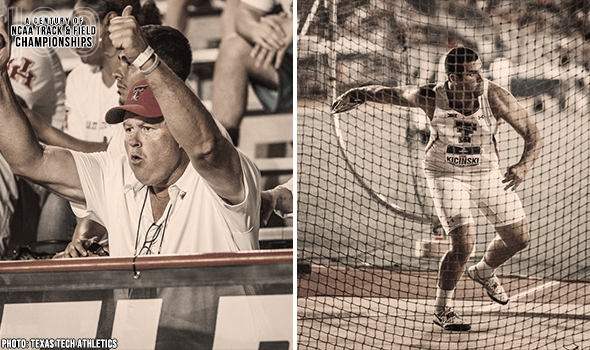
Let’s Discus(s) Some NCAA Throwing History
Cliff Felkins & Eric “Duke” Kicinski both won discus titles at the NCAA DI & NCAA DII level and were members of Texas Tech’s national championship team in 2019.
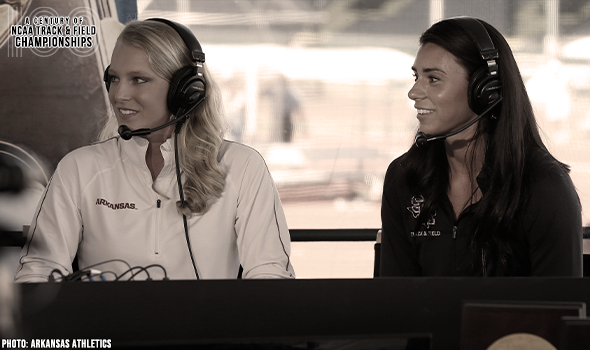
“Year Of The Vault” Ends In Epic Duel
Sandi Morris and Demi Payne raised the bar in the Women’s Pole Vault during an epic 2015 season that was dubbed “The Year of the Vault.”
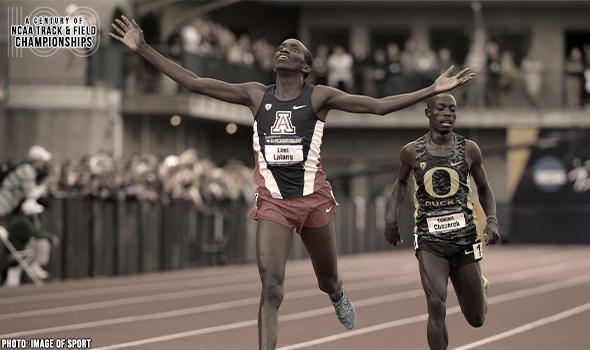
Lalang Avenged Loss, Made History
Lawi Lalang beat Edward Cheserek in a thrilling duel to set a meet record in the 5000 Meters at the 2014 NCAA DI Outdoor T&F Championships & doubled back to finish runner-up in the 1500 Meters the next day.
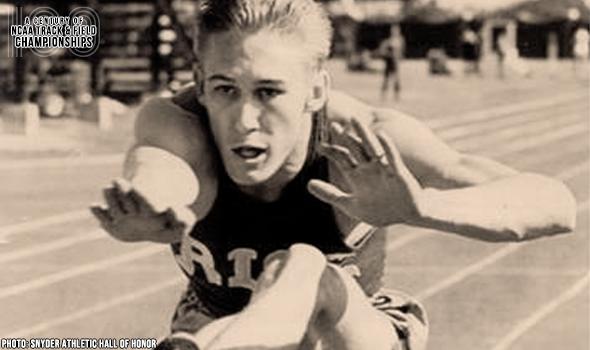
Wolcott Hurdled Into NCAA History
Fred Wolcott of Rice won five NCAA hurdling titles at the NCAA Outdoor Track & Field Championships, including three consecutive crowns in the 220-yard version.
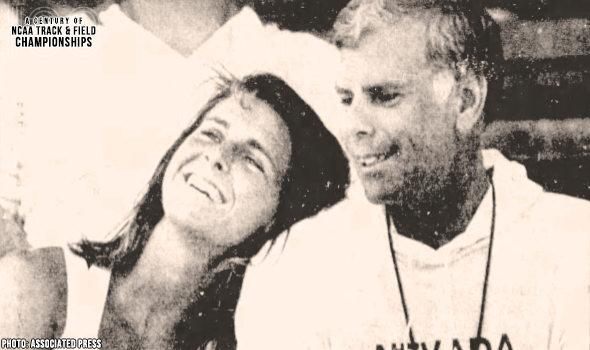
Tarr Family Collects Father-Daughter NCAA Crowns
Jerry Tarr & Sheila Tarr were the first father-daughter pair of each win an individual NCAA title at the NCAA DI Outdoor Track & Field Championships.

